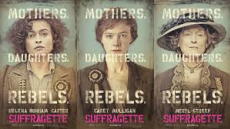
This film is part of a series of many feminist-themed films that have come out in the last few years, and other films of this type include Made in Dagenham. By focusing on a small group of women, both films seek to promote the roles of ordinary women in making big changes in history for all women. But Suffragette has come under fire for a variety of reasons, namely the “whitewashing” of the women’s rights movements. This means it focuses on the white women, and not the worldwide movement it really was.
The film is set in London slums, and tells the story of a group of mistreated women who work in a laundry. They are subjected to sexual and emotional abuse by their male boss, something which was a very frightening risk to poor women at the time. These women workers just want to make ends meet to feed their families, but they become radicalised when they find out the male politicians at Westminster aren’t willing to help them. Politely asking for the vote has not worked, thus they have to take a more drastic course of action to get their voices heard. Women face opposition from their own husbands, not to mention the judgements from other women. Eventually, they become nationally famous and have to fight against police brutality to get what’s right.
The film’s lead role is played by Carey Mulligan, an actress who seems to be in almost everything these days. There are other British actors in it as well, including Ben Whishaw and the fantastic Romola Garai. Meryl Streep made a brief appearance as the most famous suffragette, Emmeline Pankhurst. But the star who shone the brightest was Helena Bonham Carter, who is always captivating. She played a pharmacist with a degree from the University of London, the only university which awarded women full degrees at the time. But the film also gives less well-known actors a chance to shine, by portraying real historical characters with an incredible amount of courage. The actor who played Emily Davison, a suffragette who became a martyr when she threw herself in front of the king’s horse for women’s rights.
An epilogue at the end states that women got the right to vote in 1918, and didn’t get full equality with men until 1928. This is true, but the film neglected to mention one very important reason women got the vote – the First World War. The War decimated the male population, and women took on greater importance by helping out with the war effort. But one should not believe that the vote was given to women as a gesture of goodwill – it merely became an unavoidable issue once the war was over. Women in France got the vote in 1944, at the end of the Second World War, which shows just how much war mattered for women trying to gain the vote.
If you liked Made in Dagenham, you’ll probably like this story of working class women making a difference. Or even if you enjoy films about social justice, and doing the right thing. But if you’re a fan of historical accuracy, it’ll probably annoy you!
Image from: http://www.left.it/2015/11/17/la-carica-delle-suffragette-al-torino-film-festival/

0 Comment:
Be the first one to comment on this article.